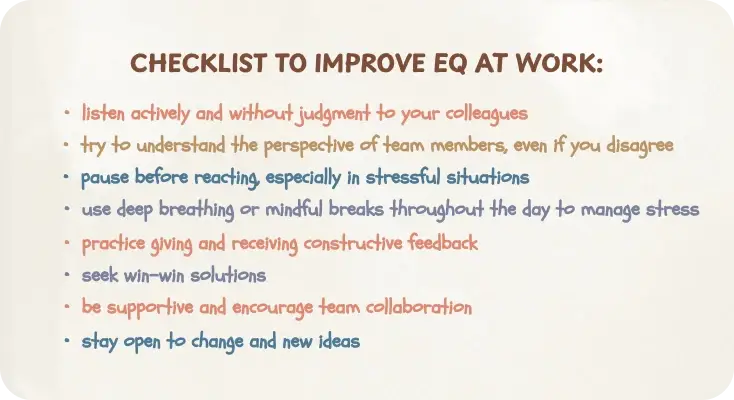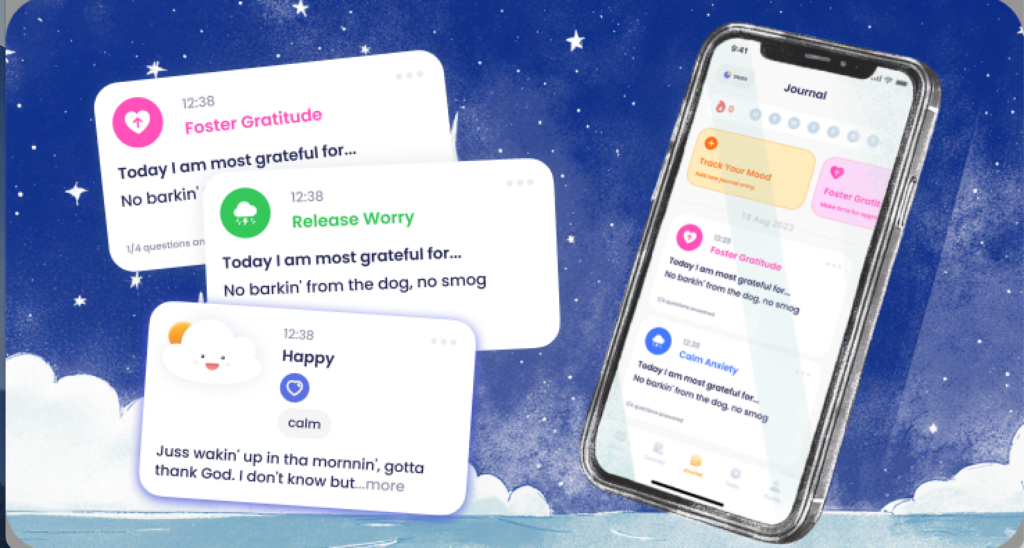Emotional intelligence (EQ) is an important factor that influences many aspects of life, such as relationships, careers, and overall well-being.
Let’s look at how emotional intelligence in the workplace helps you manage relationships, and how to become emotionally intelligent to make communication more productive.
The Core Components of Emotional Intelligence
Emotional intelligence is defined as a person’s ability to recognize, understand, and manage your emotions, as well as the ability to understand the feelings of other people. In his extensive work researching and defining emotional intelligence, behavioral psychologist Daniel Goleman identified five key aspects of an emotionally intelligent person:
1. Self-awareness
This aspect of emotional intelligence isn’t just about emotional awareness; self-awareness refers to a greater understanding of the nuances of your personality, behavior, and thinking. This refers to understanding how other people see and respond to you and how your actions affect those around you.
People experience and express various emotional states in different ways, and the more we understand how to deal with them, the better we will understand the people around us.
This doesn’t mean you have to worry too much about what people think of you. Rather, it’s about being able to objectively assess and take into account how others perceive you and understand the reasons for that perception.
In addition, self-awareness means identifying your strengths and weaknesses and being realistic about your capabilities. Thus, recognizing your weaknesses may help you overcome them, and recognizing your strengths allows you to use them well, feel more confident, and become the best version of yourself in your work life.
2. Self-regulation
Self-regulation is the ability to manage emotions and your reactions to them. It means that you do not allow yourself to be influenced by external factors but, on the contrary, try to focus on the task at hand. Once you learn to recognize and differentiate your emotions, you can begin to respond to them more effectively.
Naturally, you may stick to your core values and opinions, but it is important to understand when and how to express these views in the workplace to be sure you’re responding appropriately. If you cannot control your emotions, you can be considered an unreliable or unpredictable person for the team.
This does not mean that you should hide your feelings or try to be a “nice guy.” When you are good at self-control, you can correctly, professionally, and consciously cope with your emotions.
3. Motivation
When you’re aware of your professional responsibilities and believe that your hard work is fueled by both financial gain and personal ambition, you can improve the quality of your work and achieve greater results.
There is nothing wrong with wanting to be admired and achieve financial success. Moreover, statistics from 2025 indicate that 85% of financial success stems from “human skills,” including motivation, communication, negotiation, and leadership.
However, if that is all you work for, you may not feel truly satisfied in your professional life. In the same way, you do not have to work hard just to please your boss or clients. You may strive to achieve goals and find satisfaction at work through the development of emotional intelligence.
Here are some more interesting statistics regarding motivation at work:
- Performance is directly impacted by employee engagement. Highly engaged employees have an 81% higher attendance rate than less engaged employees, which translates into a 14% increase in productivity.
- Reduced rate of employee turnover. Employees who are actively involved in their work are 18% less likely to quit. This percentage rises to 43% in businesses with low turnover.
- Higher profitability for the business. Sales are up 18%, and client evaluations are up 10%, respectively, for highly engaged employees. In the end, a 23% increase in profitability is the result of employee engagement.
- Greater inventiveness. In contrast to those who don’t feel included, engaged employees are more likely to be proactive and show creative work approaches, becoming a source of fresh concepts.
- A deep dedication to a business. Workers who are enthusiastic about their work and feel like they belong there are more committed to the organization. Additionally, they are 23 times more likely to recommend the company to other potential workers.
4. Empathy
Emotional intelligence also involves an attempt to understand others’ emotions. Naturally, an emotionally intelligent person can learn from past mistakes and acknowledge them, as well as understand different points of view. You do not have to agree with everything your colleagues say or do. But you may avoid taking things personally and try to understand others’ emotions to foster more intentional interactions and communication within your workplace.
Curious how your personality affects your empathy and emotional intelligence? Take the personality type test to discover your natural communication style.
5. Social skills
Social skills are the ability to build relationships, collaborate, and communicate effectively. It’s not just about being friendly but also being sociable and open, and making sure that the other person feels heard and satisfied.
Developing social and intrapersonal skills contributes to a more productive, motivated, healthy, and happy work environment. According to research, teams where members know how to communicate and understand themselves and each other perform their work more effectively.
You don’t need to become everyone’s best friend. It’s much more important to understand what your colleagues are thinking and how they perceive your own behavior and actions.
Why Emotional Intelligence Matters in the Workplace?
Here are three benefits of being an emotionally intelligent person in the workplace:
1. Control of Emotions
When you have a high level of emotional intelligence, you can better control your emotions. This is especially important for conflict management when it is easy to lose your temper, misinterpret another person’s words, or have emotional outbursts.
For example, during a stressful moment at work, a colleague makes a critical remark. Instead of immediately responding defensively, you may pause, acknowledge your feelings, and decide to give a thoughtful response that will not escalate the situation.
2. Reading Other People’s Emotions
Empathy is a key component of emotional intelligence, which allows you to talk to anyone and pick up on other people’s nonverbal cues: body language, tone of voice, and facial expressions. These cues help you understand a person’s mood and intentions.
For instance, your coworker says they’re doing well, but their tone and facial expressions indicate that something is wrong. When you pick up on this signal, you can ask a clarifying question: “You seem a little worried; what’s wrong?”
3. Improving Teamwork
Another example of emotional intelligence at work may be when an emotionally intelligent manager notices that one of the employees is withdrawn and avoids participation in group discussions. A manager offers them a one-to-one conversation to understand their opinion in a comfortable environment, which helps to create a trusting relationship.
Typically, people with high emotional intelligence are better able to understand the emotional needs and motivations of others, which allows them to approach each team member in a friendly manner. This is important for creating an atmosphere of trust and improving team spirit.
How to Show Emotional Intelligence at Work
Checklist to improve EQ at work:
- Listen actively and withhold judgment
- Try to understand the perspective of team members, even if you disagree
- Pause before reacting, especially in stressful situations
- Use deep breathing or mindful breaks throughout the day for better emotional regulation
- Practice giving and receiving constructive feedback
- Seek win-win solutions
- Be supportive and encourage team collaboration
- Stay open to change and new ideas
The following EQ skills may improve your communication at work:
1. Reflect on your emotions
To better understand and manage your emotions, take a moment and ask yourself how you feel and what your contribution is to the work process. If you feel disconnected or misunderstood within your team, analyze why this is happening and what actions or statements you made may have led to the current situation.
Pay attention to your thoughts and feelings, and try to understand how different situations can affect you or provoke emotional reactions. When working, ask yourself whether you can perform equally well in a frustrated or calm state, and try to understand how your mental state affects the quality and effectiveness of your work. You may use these self-reflection questions to dig deeper and reconnect with what really matters.
2. Work on self-regulation
Avoid making impulsive decisions. The principle of “think before you act” is an important part of self-regulation. Consider how your actions or words may affect your work environment and colleagues. Ask yourself if the way you communicate your ideas is effective and constructive.
Here are some of the main techniques:
- Distinguish between tasks you can solve and those you cannot control, and focus on what can be fixed.
- Set aside time to solve specific tasks and try not to think about problems before the set time so that you do not burden yourself with them throughout the day.
- Practice mindfulness. Step back and look at the problems you are facing from a distance. Take time to focus on your breathing and separate yourself from your problems.
- Write down your feelings. This may help you clarify and define uncertainties and find real solutions.
- If you are upset, irritated, or experiencing any negative emotions, use grounding practices, take a break, and share your experience with your colleagues.
Practicing self-regulation may help you better adapt to the workplace changes and not lose focus. If you can manage and prioritize emotional issues, you will be able to manage your workload and prioritize your work tasks in the same way.
3. Stay motivated and enthusiastic
If you’re struggling to find motivation at work, ask yourself what you want out of your job and career. Figure out what drives you, where you see yourself in the future, and what you need to do to get there.
To find motivation, set realistic yet ambitious goals that help you achieve your dreams. Regular goal setting is a great way to create the conditions for motivation and improve your productivity. Here’s how you can do it:
1. Be specific and start by defining clear, focused goals. It can be “Improve presentation skills” instead of “Be better at work”.
2. Then, divide big goals into smaller, actionable steps. For example:
- Watch 2–3 TED Talks or YouTube presentations per week, observing body language, tone, and delivery.
- Take a short online course on public speaking.
- Practice presenting for 5–10 minutes daily using a mirror and recording yourself.
- Join a speaking group or club.
- Ask for feedback after meetings or presentations to identify and focus on one area of improvement per week.
- Deliver a presentation to my team by the end of the month.
4. Give each goal a deadline and measure your progress
If you’re dissatisfied and feel that you might need to recover from burnout at work, it may be time to raise the issue with your management. If you’re not enjoying your job, it’s your shared problem, so don’t be afraid to address it openly.
If you doubt whether you are in the right place or want to change your job, take an insightful temperament type test from Breeze to find out what traits define your personality and help answer the question, “What am I good at?”
5. Be empathetic, especially in disagreements
Do not ignore or completely dismiss the emotions or opinions of others that you disagree with, but try to see things from their point of view. Try to be more emotionally available, let people express their perspective, and try to learn something from your interaction.
Show compassion to other members of your workgroup, listen to them, and respond constructively. Aggression or withdrawal will only hinder free communication and the creation of a comfortable environment in the workplace, which can have a negative impact on your work and leadership positions.
6. Develop social skills
Don’t be a passive listener during a conversation. Instead, practice active listening, try to stay interested in the process, maintain eye contact, participate in the discussion, and demonstrate that you are truly willing to learn. Earn the trust of your colleagues through qualities such as conscientiousness, optimism, and friendliness.
When it comes to empathy and social skills, it is important to remember the following:
- Listen to your colleagues.
- Don’t interrupt people.
- Make sure your feedback is always constructive.
- Be open and sincere, and encourage others to do the same.
- Learn to recognize the signs of burnout in yourself and other team members and take appropriate action.
- Make time for joint activities.
You can also take the informative “What Career Is Right for Me?” quiz to discover your strengths and weaknesses, find areas for improvement, and explore career paths that align with your personality and aspirations.

Supporting Employees with Low Emotional Intelligence
Working with coworkers who lack self-awareness can reduce a team’s success by half and, according to research published in Harvard Business Review, cause stress and lower motivation.
According to a survey of 500 managers, 57% of participants believed that the team’s top performers were likely to have high emotional intelligence. However, as indicated by the same survey, 68% of organizations lack formal tools for identifying, developing, or utilizing emotional intelligence.
Additionally, only 42% of employers offer specialized training to support workers in developing emotional intelligence. So, how to support employees with low emotional intelligence in the workplace? Here are a few tips:
1. Demonstrate high emotional intelligence through your own actions
Show empathy and communicate clearly and calmly. For example, if a project fails, instead of blaming, say, “Let’s talk about what didn’t work and how we can approach it differently next time.”
2. Offer constructive feedback
Avoid comments like “You’re too blunt” or “You lack creativity.” Instead, describe the behavior and its impact and suggest alternatives. You can say, “In yesterday’s meeting, your tone may have sounded harsh when you interrupted Anna. Next time, let’s try letting everyone finish before responding.” This focuses on behavior, not personality.
3. Encourage self-reflection
Ask open-ended, reflective questions such as “How do you think the team responded to your feedback today?” or “What could you try differently next time?” This may help a person think critically about their communication patterns.
4. Share training resources
These can be like books, motivational podcasts, or online courses that support emotional development.
Hannah Schlueter, MA, LAC, shares her insights on how to support employees with low EQ. “Supporting employees with low EQ’s requires collaboration, patience, and resources. As the article mentioned earlier, higher EQ’s result in higher productivity and profits, so it is in employers’ best interest to invest into the EQ development of its employees. Offering resources such as trainings, access to therapy, and empathic leadership at low or no cost to the employee are a few places to start.”
Emotional Intelligence in Leadership
The DDI, a global leadership consulting firm, ranks empathy as the number one leadership skill, reporting that leaders who are empathetic are more than 40% better at coaching, engaging others in teamwork, and making good decisions. This year’s research by Indeed and Forrester shows that 57% of employees believe their employer is responsible for their happiness and well-being at work.
Moreover, 87% of millennials today are motivated by the emotional intelligence of their bosses, which helps companies succeed, according to 2025 statistics by Electro IQ. As a result, 52% of companies select senior managers based on their emotional intelligence skills.
Thus, leaders with emotional intelligence skills more often show genuine interest in their employees and care for their emotional well-being. An empathetic and emotionally intelligent manager has a better understanding of when and why an employee is feeling unmotivated.
This, in turn, gives them an opportunity to take timely measures to bring back positive moods, inspire the team, increase their job satisfaction, energy level, and focus on the task, and improve workplace performance.
As a result, effective leaders may influence team members at different levels, build collaborative relationships, negotiate effectively, engage in difficult conversations, and make decisions under conditions of complexity and uncertainty. Due to their high empathy and self-awareness, they can also influence without coercion or abuse of power, which requires using their personal authority, resources, and approaches.
Tools & Resources for Strong Social Skills in the Workplace
Developing emotional intelligence skills may help you build self-confidence and self-awareness and improve your self-control and decision-making skills. Here’s a list of tools and resources to help you improve your emotional intelligence quotient:
1. Books & Guides
By Daniel Goleman:
- Emotional Intelligence: Why It Can Matter More Than IQ. The classic that started it all. The book introduces the five key components of EQ.
- Social Intelligence: The New Science of Human Relationships. Explores how our relationships shape our brains and emotions.
- Working with Emotional Intelligence. Focuses on EQ in the workplace and leadership development.
- Focus: The Hidden Driver of Excellence. A deep dive into attention, mindfulness, and their relationship to EQ.
- The Emotionally Intelligent Leader. A collection of Goleman’s Harvard Business Review articles.
Other notable books to improve self-regulation, motivation, and empathy:
- Emotional Agility by Susan David. A guide that teaches you how to develop flexibility and mindfulness and align your actions with your values.
- “Nonviolent Communication” by Marshall Rosenberg. Excellent book for improving empathy and conflict resolution skills.
2. Learning & Development Platforms
- Inspiring Leadership through Emotional Intelligence by Case Western Reserve University, featuring Richard Boyatzis, Goleman’s collaborator at Coursera.
- “Emotional Intelligence at Work” at Udemy.
- Daniel Goleman Emotional Intelligence (DGEI). The platform offers training, podcasts, and a 12 Competency-Based Model used in coaching and leadership.
- Greater Good Science Center (UC Berkeley). Free resources and online courses related to empathy, mindfulness, and social-emotional well-being.
3. Top Podcasts for Emotional Intelligence
- Daniel Goleman’s Emotional Intelligence Podcast. In-depth discussions on Goleman’s Emotional Intelligence Competency Model, leadership, mindfulness, empathy, and more.
- The Art of Charm by AJ Harbinger & Johnny Dzubak. Hosts bring their 11 years of coaching experience to self-motivated people on how to become the best version of yourself.
- Unlocking Us by Brené Brown. It’s a podcast focusing on what makes a great leader and how to work on yourself.
4. Self-Discovery App for Daily Practice
Are you looking for psychological tests and tools for daily practice? The Breeze Wellbeing app is the all-in-one platform that may help you:
- Improve your emotional intelligence
- Reduce stress
- Set meaningful goals
- Create a clear routine
- Explore yourself

Bonus Tip: Valuable Resources from the Expert to Improve Your Emotional Intelligence Skills
Hannah Schlueter, MA, LAC, shares her thoughts, “Starting to work on your emotional intelligence skills does not have to be as daunting as it might seem. Outside of all the online resources to help boost your EQ, a great first step would be to get comfortable identifying and learning more about your own emotions. Labeling how you feel throughout the day grants you the opportunity to track patterns or process in more depth at a later time. This habit then builds a foundation for increased empathy and use of more complex interpersonal skills down the road.”
Sources
1. Saisuman Revankar (Electro IQ). Emotional Intelligence Statistics By Demographic, Age, Success, Region and Importance. January 2025.
2. Jim Harter. Employee Engagement vs. Employee Satisfaction and Organizational Culture. August 13, 2022.
3. Coronado-Maldonado I, Benítez-Márquez MD. Emotional intelligence, leadership, and work teams: A hybrid literature review. September 2023.
4. Tasha Eurich. Working with People Who Aren’t Self-Aware. October 2018.
Disclaimer
This article is for general informative and self-discovery purposes only. It should not replace expert guidance from professionals.
Any action you take in response to the information in this article, whether directly or indirectly, is solely your responsibility and is done at your own risk. Breeze content team and its mental health experts disclaim any liability, loss, or risk, personal, professional, or otherwise, which may result from the use and/or application of any content.
Always consult your doctor or other certified health practitioner with any medical questions or concerns
Breeze articles exclusively cite trusted sources, such as academic research institutions and medical associations, including research and studies from PubMed, ResearchGate, or similar databases. Examine our subject-matter editors and editorial process to see how we verify facts and maintain the accuracy, reliability, and trustworthiness of our material.
Was this article helpful?






